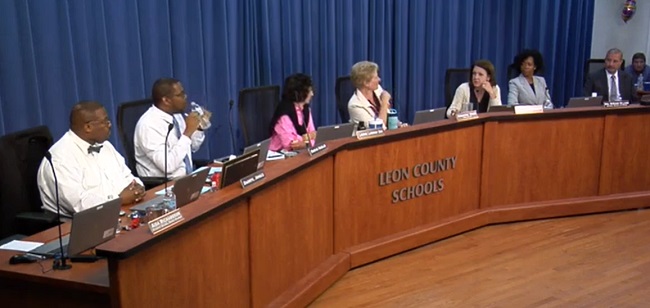By Jim Saunders, The News Service of Florida
TALLAHASSEE — When Florida voters went to the polls in 1998, they passed a constitutional amendment that made a series of election-related changes, including requiring nonpartisan races for county school board seats.
But 26 years later, voters could change course.
Voters are casting ballots on a proposal, known as Amendment 1, that would require partisan school-board elections starting in 2026.
The Republican-controlled Legislature put the proposal on the Nov. 5 ballot, in part saying including party labels for candidates would increase transparency about school-board elections, which often are already battlegrounds for Republicans and Democrats.
“This is not about, at least for me, advancing the cause of one political party over another. But for me it’s about transparency, and I simply believe that we have an obligation to give voters as much information about a candidate as possible, and let them make a decision about vetting a candidate,” Rep. Spencer Roach, a North Fort Myers Republican who sponsored the proposal, said last year as a House panel debated the issue.
But critics argue the proposal is an effort to consolidate power by Republicans, who hold voter-registration edges in 57 of the state’s 67 counties.
In a video posted on Facebook, Rep. Anna Eskamani, D-Orlando, said keeping non-partisan school board races would help reduce “political polarization” in communities.
“I do think that Republicans are trying to change this so that it will be much more difficult for more thoughtful, rational individuals to run for school board in more-red counties,” Eskamani said in the post. “This is designed to make it impossible for them to win.”
The proposed amendment comes after controversies have roiled many school boards in recent years about issues such as mask mandates during the COVID-19 pandemic and removing or restricting school library books. Also, Republican Gov. Ron DeSantis has taken a high-profile role in trying to help elect conservatives to school boards in some parts of the state.
School board races traditionally were partisan, but that changed after 64 percent of voters approved the 1998 constitutional amendment. In addition to requiring nonpartisan school board races, the 1998 amendment included election-related changes such as putting a public campaign financing program in the Constitution.
Lawmakers also have proposed a measure, Amendment 6, on the Nov. 5 ballot that would repeal the public campaign financing program, which makes available state matching money to candidates for governor and Cabinet seats.
Florida’s political landscape and education system have undergone dramatic changes since the 1998 amendment passed. Republican Gov. Jeb Bush was first elected in 1998, with the GOP controlling the governor’s office and both chambers of the Legislature ever since.
As an example of changes in the education system, Bush began a move toward school vouchers that has now become a full-blown voucher program — long a priority of Republicans and anathema to most Democrats and their allies in teachers unions.
Amendment 1 would need approval from 60 percent of voters to pass Tuesday. It has received relatively little attention, overshadowed by fierce political fights about other proposed amendments aimed at allowing recreational use of marijuana and enshrining abortion rights in the Constitution.
The Republican Party of Florida Executive Board approved a resolution in May that included supporting the school-board amendment. But party Chairman Evan Power indicated recently to The News Service of Florida that it is unclear if the measure will pass.
“I think that’s a tough road,” Power said. “I think we see that’s a polarizing issue. And it’s hard to get to 60 percent on something that is kind of polarizing.”
— Staff writer Jim Turner contributed to this report.


@ Edward Lyle = There is no such thing as “nonpartisan” races in any political race because many people will always ask you one of two questions: ONE> How are you Registered or TWO> Who are you Voting FOR for Governor or President.
There is no such thing as “nonpartisan” school board races, or any political race for that matter… it’s a designed illusion that allows mental degenerates to sneak into public office, and particularly school board seats to continue to indoctrinate the impressionable minds of children.
But there are NPA Candidates.
The very existence of a “two-party” system is predicated on division. If you have no division, you have no two-party system. We’ve been asleep at the wheel on school board seats for far too long. The damage these progressive wackjobs have done is almost irreversible.
@ FLC
“…..Rep. Anna Eskamani, D-Orlando, said keeping non-partisan school board races would help reduce “political polarization” in communities.”
Really? That belief is apparently not working in Leon County, probably the most “politically polarized” community in the state, if not the entire country.
“This is not about, at least for me, advancing the cause of one political party over another. But for me it’s about transparency, and I simply believe that we have an obligation to give voters as much information about a candidate as possible, and let them make a decision about vetting a candidate,” Rep. Spencer Roach
“I do think that Republicans are trying to change this so that it will be much more difficult for more thoughtful, rational individuals to run for school board in more-red counties,” Eskamani said
You cannot get much more different viewpoints than that, and certainly not more arrogant, divisive and insulting than the quote from Eskamani.
Non partisan school board elections favor leftists getting elected.
Go back to partisan